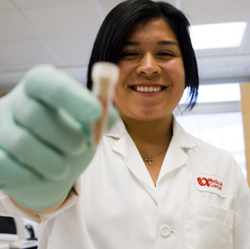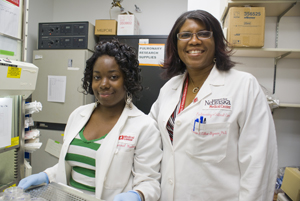Each summer, UNMC hosts about 90 undergraduate and graduate students in the Summer Undergraduate Research Program.
Students conduct research, gain health care career preparation skills and collaborate on health disparities research.
Below, two students who participated in the program this summer comment on their UNMC experiences.
Juana Acosta — a Californian who is a senior at the College of Saint Mary — is working to earn a double degree in biology and chemistry and a minor in forensics.
“I’ve been researching as an undergraduate, but it’s not the same level,” Acosta said.
She works in the Durham Research Center (DRC) under Dr. Laurey Steinke, the lab director.
“This program lets us use a lot more skills and advanced equipment,” Acosta said.
 |
Juana Acosta holds a capsule of protein. (Andrew E. Nelson/UNMC public relations) |
She conducts a research project that involves the relationship between optimum temperature and protein quantity found in bacteria. Her assumption is that the higher the temperature, the more protein will be created.
After achieving her graduate degree, Acosta plans to become a pediatric dietitian.
“Being a pediatric dietitian is rewarding because I would get to be a teacher for children,” she said.
Angelica White is an East St. Louis, Ill., native who recently graduated from Alcorn State University with a double degree in chemistry and biology.
 |
Angelica White shows a tray of chemicals to her overseer Dr. Diane Allen-Gipson. (Andrew E. Nelson/UNMC public relations) |
She works in Durham Research Center II under Diane Allen-Gipson, Ph.D., the lab director.
Through the course of the summer program, White has worked on a research project to gain more experience. Her work lets her see how cigarette smoke extract (CSE) promotes the generation of hydrogen peroxide in the lung cells, which ultimately results in airway damage.
“I want to eventually make a career doing cardiac surgery,” said White, whose future plans also include graduate school and residency. “I am also considering becoming a pediatrician.”